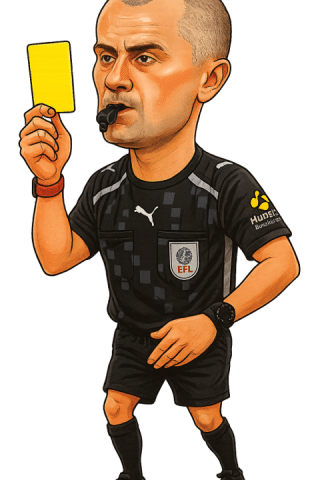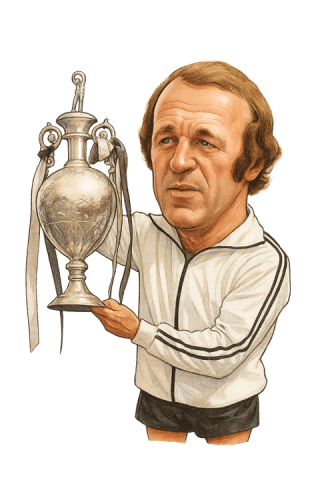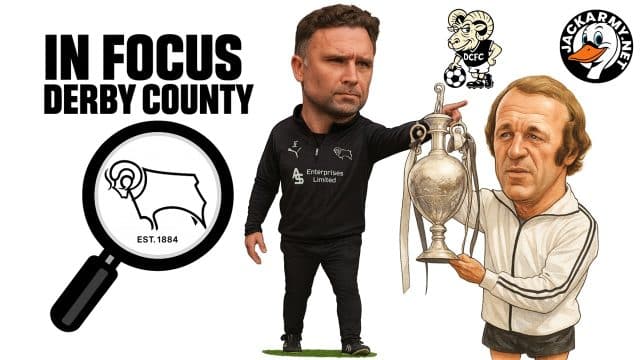The latest chapter in our In Focus series arrives with a sense of anticipation and change. Tuesday night at the Swansea.com Stadium is not just another fixture; it is likely to mark the beginning of the Vitor Matos era in SA1. For supporters, that alone adds a layer of intrigue to what might otherwise be seen as a mid‑season clash. The Swans, searching for rhythm and identity, now look to a new voice in the dugout, a fresh set of ideas, and the possibility of a reset.
Derby County provide the opposition, a club with its own storied past and a fanbase that travels through the highs and lows with unflinching loyalty. The Rams arrive in South Wales with renewed confidence after a turbulent start to their campaign, and they will see this as a chance to test Swansea’s resolve under new leadership. For the Swans, the fixture is about more than points; it is about setting the tone for what comes next.
This series has always been about more than just the football. It is about context, history, and the human stories that shape the ninety minutes. Derby County bring all of that with them: a club that has tasted glory, endured hardship, and continues to fight for relevance in the modern game. As the floodlights flicker on Tuesday evening, the Swans faithful will be watching closely, not only to see how their side responds to the new era, but also to measure themselves against an opponent with its own ambitions.
The stage is set. The narrative is rich. And as ever, we go In Focus this time on Derby County.
Who Are Derby County?
 Derby County Football Club, known to all as the Rams, were founded in 1884 as an offshoot of Derbyshire County Cricket Club. The idea was to give players and supporters a winter pursuit and to generate extra income for the cricket club. Within just a few years, Derby had established themselves on the football map, joining the inaugural Football League in 1888 as one of its twelve founder members.
Derby County Football Club, known to all as the Rams, were founded in 1884 as an offshoot of Derbyshire County Cricket Club. The idea was to give players and supporters a winter pursuit and to generate extra income for the cricket club. Within just a few years, Derby had established themselves on the football map, joining the inaugural Football League in 1888 as one of its twelve founder members.
The club’s early decades were marked by steady progress, and by the 1930s Derby were a force in English football, finishing runners‑up in the league twice. Their first major silverware arrived in 1946 when they won the FA Cup, defeating Charlton Athletic 4–1 at Wembley in the first post‑war final. This triumph cemented their place among the country’s respected clubs.
The golden era came in the 1970s under Brian Clough and later Dave Mackay. Clough led Derby to their first league title in 1972, and Mackay repeated the feat in 1975. Those years also brought European adventures, including a run to the semi‑finals of the European Cup. It was a period that defined Derby’s identity as a club capable of mixing it with the very best.
Since then, Derby have experienced fluctuating fortunes. They reached the Premier League in the late 1990s and again in the 2000s, but also endured relegations and financial struggles. Their home has been Pride Park Stadium since 1997, a modern ground that replaced the Baseball Ground, itself a historic venue steeped in memories. Through it all, Derby’s black‑and‑white colours and ram mascot have remained constant symbols of pride and tradition.
Their Manager – John Eustace
Derby County are now under the guidance of John Eustace, who was appointed as Head Coach in February 2025 on a con tract running until the summer of 2028. For Rams supporters, his arrival marked the return of a familiar face, as Eustace had two spells as a player at Pride Park, first on loan in 2009 and then permanently between 2013 and 2015, when he closed out his career in midfield.
tract running until the summer of 2028. For Rams supporters, his arrival marked the return of a familiar face, as Eustace had two spells as a player at Pride Park, first on loan in 2009 and then permanently between 2013 and 2015, when he closed out his career in midfield.
Eustace’s managerial journey began at Kidderminster Harriers in 2016, where he earned plaudits for his tactical organisation and ability to develop players. He then spent four years on the coaching staff at Queens Park Rangers, combining that role with work alongside the Republic of Ireland senior men’s team. His first Championship management role came at Birmingham City in 2022, where he stabilised the club and even had them in the top six before departing early in the 2023–24 season. He later took charge at Blackburn Rovers, again guiding them into the play‑off places before moving on.
At Derby, Eustace inherits a squad that has endured turbulence but is now looking upward. His reputation is built on discipline, clarity, and a calm approach, qualities that the Rams hierarchy believe can bring stability and progress. Supporters have welcomed his appointment with optimism, recalling his leadership as a player and hoping he can instil the same resilience from the touchline. With Derby sitting mid‑table but within touching distance of the play‑offs, his task is to harness momentum and push the club back toward the heights it once knew.
The Man in the Middle
Taking charge of Tuesday night’s clash at the Swansea.com Stadium will be referee Andrew Kitchen. Kitchen is one of the newer officials on the Championship circuit, having stepped up from League One in recent seasons. His rise through the ranks has been steady, marked by a willingness to let the game flow while still showing authority when discipline is required.
 Kitchen has already overseen fixtures involving both Swansea and Derby, and supporters will recall his style as firm but fair. He is not afraid to brandish cards if challenges cross the line, yet he prefers to keep the game moving rather than constantly stopping play. That approach can suit sides who want rhythm, though it also means players must be careful not to test his patience.
Kitchen has already overseen fixtures involving both Swansea and Derby, and supporters will recall his style as firm but fair. He is not afraid to brandish cards if challenges cross the line, yet he prefers to keep the game moving rather than constantly stopping play. That approach can suit sides who want rhythm, though it also means players must be careful not to test his patience.
For Swansea fans, Kitchen’s presence brings a degree of intrigue. He has officiated their matches before without major controversy, but every referee carries the weight of past decisions in the eyes of supporters. Derby, too, will know what to expect, having had him in charge of their fixtures earlier this season.
His appointment for this midweek fixture reflects confidence in his ability to manage two sides who will be desperate to impose themselves early. With emotions running high as Swansea potentially begin a new era under Vitor Matos, Kitchen’s role in keeping control will be vital. The man in the middle may not seek the spotlight, but his decisions could shape the rhythm and outcome of the evening.
The Season So Far
Derby County’s campaign has been a tale of two halves. The Rams opened the season in miserable fashion, winning just once in their first eleven league fixtures. That run left them hovering near the bottom of the table and raised real concerns among supporters about whether this would be another year of struggle.
Then came the turnaround. From late October into early November, Derby strung together five consecutive victories. They beat Norwich 1–0 at Pride Park, followed that up with another 1–0 home win against QPR, then stunned Sheffield United 3–1 away. Hull were dispatched 2–1 at Pride Park, and Blackburn were beaten 2–1 at Ewood Park. Suddenly, the mood shifted. The same side that had looked bereft of confidence was now playing with belief and resilience, climbing into mid‑table and sparking talk of a possible play‑off push.
That momentum was checked on November 22 when Watford came to Pride Park. Derby led 2–0 thanks to goals from Dion Sanderson and Sondre Langås, but a late collapse saw Watford score three times in the final half‑hour to snatch a 3–2 win. It was a bitter pill to swallow, yet the bigger picture remains encouraging. With six wins from sixteen games, Derby sit comfortably in mid‑table on 23 points, just two shy of the play‑off places.
For John Eustace and his players, the lesson is clear: in the Championship, momentum can change quickly. The Rams have shown they can put together a run, and if they can rediscover that rhythm, the season could yet hold promise.
Rams Eye View
 “I’ll be honest, those first few weeks were tough,” says Caitlin, a Derby season ticket holder in her thirties who goes to Pride Park with her husband and two boys. “One win in eleven had us all worried. The lads were quiet on the way home, and we were starting to wonder if it was going to be another slog of a season.”
“I’ll be honest, those first few weeks were tough,” says Caitlin, a Derby season ticket holder in her thirties who goes to Pride Park with her husband and two boys. “One win in eleven had us all worried. The lads were quiet on the way home, and we were starting to wonder if it was going to be another slog of a season.”
The mood changed when Derby found their rhythm. “Five wins in a row lifted everything. The boys were buzzing again, talking about goals and celebrating like kids should. You could feel the difference in the stands too, people were smiling, singing, believing again.”
Looking ahead to Tuesday night, Caitlin is confident. “I think we’ll win at Swansea. We’ve shown we can put a run together, and even though they’ve got a new manager coming in, we’re in a good place. It feels like we’ve turned a corner.”
She admits the family will not be making the trip to South Wales. “It’s a school night, so we’ll be watching from home. But we’ll be cheering just the same. The boys are already planning what snacks we’ll have for the game. That’s what football does, it gives you those moments back when you thought they were gone.”
The League Champions
Derby County’s greatest era came in the 1970s, first under Brian Clough and then Dave Mackay. In the 1971–72 season, Clough and his assistant Peter Taylor built a side that stunned English football by winning the First Division title. It was Derby’s first ever league championship, achieved with a squad that blended experienced campaigners like Roy McFarland and Colin Boulton with the flair of Kevin Hector and Alan Hinton.
assistant Peter Taylor built a side that stunned English football by winning the First Division title. It was Derby’s first ever league championship, achieved with a squad that blended experienced campaigners like Roy McFarland and Colin Boulton with the flair of Kevin Hector and Alan Hinton.
The title win was dramatic. Derby finished on 58 points, just one ahead of Leeds United and Liverpool, and had to wait nervously after completing their fixtures while rivals still had games to play. When results went their way, the Rams were crowned champions, sparking celebrations that remain legendary in the city.
Three years later, in 1974–75, Derby repeated the feat under Dave Mackay. Mackay had taken over after Clough’s departure and steadied the club through a turbulent period. His side, built around the defensive strength of McFarland and the attacking quality of Hector and Bruce Rioch, once again rose to the top of English football. This second title confirmed Derby’s place among the elite and proved that the success of 1972 was no one‑off.
The triumphs earned Derby places in the European Cup. In 1973, Clough’s team reached the semi‑finals before losing to Juventus in a tie clouded by controversy. Two years later, Mackay’s champions also ventured into Europe, though they fell earlier in the competition. Even so, those campaigns gave Derby supporters unforgettable nights against some of the continent’s biggest names.
For the Rams, the 1970s remain the golden era. Two league titles, European adventures, and a sense of belonging at the very top of the game. It was a time when Derby stood toe to toe with giants and proved they could win.
The Prediction
We have been hopelessly wrong on the last two predictions, and in truth the Swans have been just as hopeless in the performances that followed. This time, though, there is a different feel. The likely beginning of the Vitor Matos era adds a layer of unpredictability, and supporters will be eager to see whether his ideas can spark an immediate response.
Derby arrive with confidence, buoyed by their recent run of wins even if it was checked by Watford at the weekend. They will believe they can take advantage of Swansea’s transition, and their supporters, like Caitlin, are already talking about victory.
From a Swansea perspective, the hope is that the new voice in the dugout brings energy and clarity. The players will want to impress, and the home crowd will demand a reaction. It may not be perfect, but there is a sense that the Swans can edge this one.
Prediction: Swansea City 2–1 Derby County. A tight contest, decided late, with the Swans finding just enough to mark the start of a new chapter with three points.
Looking Ahead
Our latest In Focus has taken us through the full sweep of Derby County ahead of Tuesday night’s clash at the Swansea.com Stadium. We began by setting the scene for what is likely to be the first game of the Vitor Matos era, a moment of change and anticipation for Swansea supporters. We explored Derby’s long history, from their founding in 1884 to the golden years of Brian Clough and Dave Mackay, and looked at the present under John Eustace, a manager returning to familiar ground with a reputation for calm authority.
We considered the man in the middle, Gavin Ward, whose whistle will shape the rhythm of the evening, and we tracked Derby’s season so far, from a miserable start to a run of five straight wins that lifted them into mid‑table. Caitlin’s voice gave us the Rams eye view, capturing the emotions of a supporter who has lived the highs and lows with her family and now believes Derby can win in South Wales. We revisited the glory years of the 1970s, when Derby twice won the league and tested themselves against Europe’s best, and we offered a prediction that Swansea might just edge this one 2–1 as a new chapter begins.
All of it adds up to a fixture rich in narrative. For Swansea, it is about beginnings, energy, and the hope of a reset. For Derby, it is about sustaining momentum and proving they can push toward the play‑offs. As the floodlights come on and the whistle blows, we will see how these stories unfold.

This article first appeared on JACKARMY.net.

